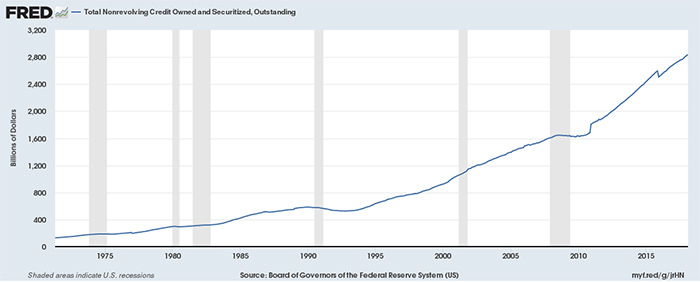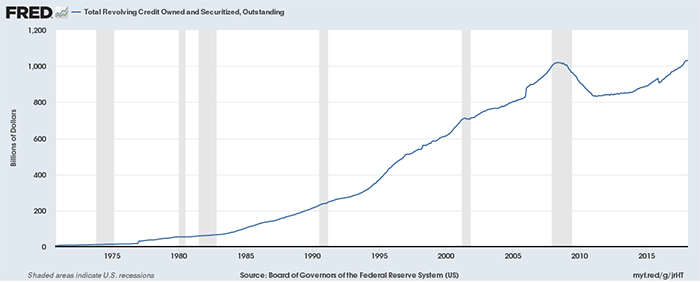We’ve been had.
It was all a flashy distraction.
My husband does the same thing when he has to leave the house. We have a 6-month-old black Labrador who absolutely adores my husband. He tries to follow my husband every time he leaves the house.
To escape without fuss, my husband grabs a toy and tosses it across the living room. Ace, our puppy, scrambles after the toy. But when he returns with the toy, my husband has already darted out the front door, and I’m left to console the confused puppy with 30 minutes of fetch.
Washington has been endlessly lobbing flashy items in our direction — tariffs, tax reform, attacks on Syria. They’ve all worked to distract us from a bigger issue that has quietly bubbled under the surface and has the power to crush the financial markets.
But you can take steps now to protect your wealth from the next collapse…
A Costly Addiction
America has a debt problem.
Don’t shrug!
I know we’ve all heard it for years. We pile up more debt year after year. Over the past several years, we’ve managed to ignore the growing monster in the corner. We’ve had the benefit of insanely low interest rates.
But after several rounds of rate hikes with former Federal Reserve Chair Janet Yellen, we’ve got a new chair with Jerome Powell. He’s knocked out his first 25 basis point rate hike. The Fed has its eye on at least two more this year before potentially speeding up next year.
As interest rates rise, so does the cost to pay off the debt. That’s tax money that could be better spent on items such as infrastructure, military, Social Security and other programs.
Earlier this month, the Congressional Budget Office reported that it expects the federal budget deficit to soar to more than $1 trillion by 2020. That’s two years ahead of its prior estimate.
The national debt — which is currently at $21 trillion — will skyrocket to more than $33 trillion by 2028. That represents 96% of our gross domestic product.
Over the next 10 years, we will spend approximately $7 trillion paying off debt. Interest payments alone will top $1 trillion in a decade.
More Than a Government Problem
Sadly, the government isn’t alone in its debt addiction. Americans haven’t been known to be great savers, and we love to spend. Even money we don’t have.
Consumer debt swelled by $10.6 billion in March, reaching nearly $3.9 trillion. Nonrevolving debt has topped $2.8 trillion, soaring to new heights.
Also, revolving debt has reached $1.03 trillion, going back to levels last seen during 2008 when everything fell apart thanks to the housing bubble.

Also, revolving debt has reached $1.03 trillion, going back to levels last seen during 2008 when everything fell apart thanks to the housing bubble.

As debt rises, we’re facing a situation where Americans are struggling to pay off their debt. The National Federation for Credit Counseling reported that 25% of Americans could not pay their bills on time. This is up from 22% a year ago.
Eight percent of unpaid debt has gone to collection, which is up from 5% a year ago.
We’re reaching a tipping point with debt. We’ve too often allowed ourselves to be distracted by Washington’s shenanigans when the biggest threat to our wealth has been steadily growing right in front of us.
As interest rates tick higher, that debt becomes far more expensive. Americans fall behind or cut back on spending, and the economy slows. The economy slows too much, and interest rates will come down.
But as we’ve seen in the past, it’s already too late when the Fed starts cutting rates.
Protect Your Gains From the Market Collapse
While the market is racing toward an ugly ending as it is crushed under a mound of debt, you do have options when it comes to protecting your wealth and even profiting in times of turmoil.
Ted Bauman, editor of The Bauman Letter, has frequently spoken on the importance of correctly balancing your portfolio so that it can weather a downturn in the market. Or even a market collapse.
He even has his Smart Money trading system, which gives exposure to the global markets as well as strong sectors that are growing while the rest of the market is struggling.
Furthermore, Ted’s Alpha Stock Alert portfolio uses a specially designed algorithm that balances a mix of stock positions and a hedge so that you’re protected against market downturns, and profit while the market is strong.
These systems have proven to shine when the market is struggling and we aren’t distracted by the noise coming from Capitol Hill. Take steps now to protect your wealth.
Regards,

Jocelynn Smith
Sr. Managing Editor, Banyan Hill Publishing
P.S. Kennedy Accounts are “Wall Street’s best-kept secret” … and Total Wealth Insider Editor Jeff L. Yastine considers them to be the single greatest tool in any investor’s arsenal. Because with hardly any work at all — and starting with just the smallest amount of money — you can amass a six-figure windfall. To find out why Kennedy Accounts are the No. 1 way for any investor to become obscenely rich, click here now.










